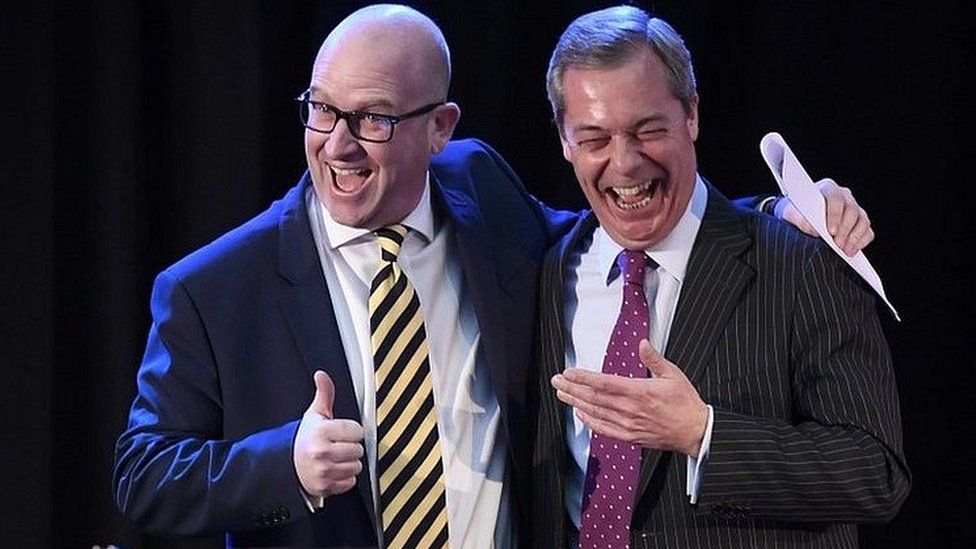What next for Paul Nuttall's UKIP?
- Published

Paul Nuttall, left, is hoping to push Labour hard in UKIP's post-Farage era
Is UKIP the most successful party in the history of British politics? Or an amateurish rabble which has lost its reason to exist? Or maybe a bit of both?
The UK Independence Party was founded in 1993 with one main goal: to take the UK out of the European Union.
Back then, the idea was way outside the political mainstream. But on 23 June the country narrowly voted to leave and Conservative Prime Minister Theresa May has vowed to implement the people's decision.
So what is the point of UKIP after Brexit?
Leader Paul Nuttall will have three main priorities for the year ahead as it faces a potentially tricky set of local elections, defending many of the council seats won in the 2013 surge:
Holding the government's "feet to the fire" over Brexit
Putting a stop to the infighting that has long plagued UKIP, especially since the referendum
Eating away at Labour's vote, particularly in northern England.
Feet to the fire
"Brexit means Brexit," says Mrs May, but as of yet, we don't know many more details.
She says she will trigger Article 50 of the EU's Lisbon Treaty before the end of March, starting two years of divorce negotiations. But there are many unresolved questions.
Should the UK continue to pay into the European budget and accept the free movement of people, in exchange for closer economic ties? Or should it pursue what some call a "clean" and others a "hard" Brexit, severing the link more definitively?
UKIP is firmly in the second camp. "The British people voted for Brexit, so we could control our borders, leave the single market, and create our own laws," the party says.
It will be on hair-trigger alert in 2017, ready to campaign against anything it sees as Brexit backsliding from the government.
Infighting
Despite its remarkable successes in 2016, at times UKIP resembled a circular firing squad.
Nigel Farage, UKIP's longest-serving leader and best known public face, does not get on with the party's only MP Douglas Carswell, or former deputy chair Suzanne Evans.
Diane James last just 18 days as UKIP leader
Diane James resigned as leader in October only 18 days into the job, causing Mr Farage to take over on an interim basis before Mr Nuttall's election.
It is hard to keep track of the various alliances and schisms. Ideological differences exist within UKIP like in all parties. But often the differences seem to be more personal than political.
The party's most ignominious fight - whether it was a literal one or not - of 2016 saw one-time leadership favourite Steven Woolfe in hospital in October following an alleged "altercation" with fellow MEP Mike Hookem at the European Parliament in Strasbourg.
Mr Woolfe subsequently left the party, saying it was "ungovernable" and in a "death spiral". But an internal report by the party said it could not "verify" whether a fight had taken place, and Mr Hookem denied striking his colleague.
If UKIP is to remain a serious force, Mr Nuttall will have to contain these sorts of tensions.
After comfortably winning his leadership election in November, two days shy of his 40th birthday, he has appointed a team from across the party.
Things seem more stable than at any time since the referendum. For now.
Blue UKIP, red UKIP
UKIP began as a thorn in the side of the Conservative Party.
But in recent years the party has had Labour voters in its sights, gaining ground in northern England and Wales.
Lots of Labour-supporting areas voted Leave in June, even though the party officially backed Remain.
Also, many of those who did not vote in the 2015 general election did in fact turn out for the EU referendum - and according to NatCen research a lot more of them backed Leave than backed Remain.
Mr Nuttall, who has working-class Northern roots, thinks these voters are closer to UKIP than Jeremy Corbyn's Labour Party on policy areas such as immigration, the EU and welfare.
UKIP will be hoping to win some of its support in 2017, causing existential problems for Labour.
A by-election early in the new year in Copeland in Cumbria, which voted Labour in 2015 and Leave in 2016, will give an early sign of whether this approach is working.
After one of the craziest years in British political history, the party will be hoping for a calmer 2017. But with UKIP, you can never quite be sure what lurks around the corner.
- Published28 November 2016
- Published26 October 2016